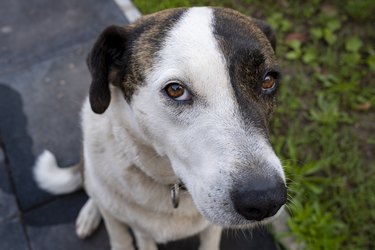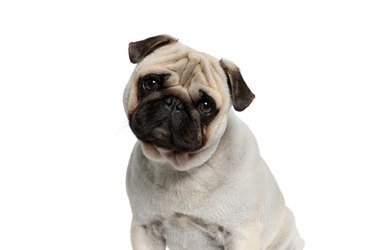You've more than likely seen it before: the laid back ears, big, expressive puppy dog eyes looking up at you, maybe even all tied together with a hard-not-to-love head tilt.

When a dog is laying on the cuteness, it feels like it happens when they know they're in trouble or they really want something from us. We know when a dog is acting cute, but do they?
Video of the Day
Video of the Day
Research has not yet been able to prove whether dogs know how to act cute, although some believe that those cute facial expressions are merely your dog manipulating you.
Do our dogs manipulate us?
Humans and dogs have coexisted for centuries, and while the exact time and circumstances surrounding domestication is still up for debate, many believe that dogs self-domesticated as a means of survival, says BBC. This idea suggests that early wolves, nomadic by nature the same as our early ancestors, hung around campsites to scavenge for leftover food. Naturally, less aggressive wolves were better suited for living within such close proximity to humans, and over time, their offspring became more and more docile, perhaps in response to the learned behavior that nice dogs get fed.
Today, our domesticated dogs still rely on us for survival, and some have added sympathetic facial expressions to their repertoire. According to a 2017 study published by Nature, facial expressions displayed by our canine companions appeared more frequently when a dog's human guardian was paying attention to them. The study was conducted to measure whether dogs were more affected by a food or the attention and emotional state of their human guardians. It found that food left out for the taking was exciting to the dog participants, but resulted in far less facial expressions made by the dogs than when their humans were paying attention and acting as keepers of the food. The facial expressions displayed by most dogs included eyebrow raising, which has also been shown to result in higher adoption rates among dogs in shelters.

Cute expressions with different meanings
While some behaviors do have what we consider to be "cute" qualities, VCA Hospitals explains that there are more logical meanings behind them. Because dogs rely on body language over verbal language to communicate, facial expressions that we consider signs of affection among humans, like smiling, raised eyebrows, and quizzical head tilts, mean something different to dogs.
What we consider to be a dog "smile," which happens when a dog scrunches up her nose and shows only her front teeth, is actually a submissive behavior used among pack dogs, like wolves. This smile is shown to alpha dogs in the social setting as an acknowledgement of the submissive dog's role in the group, which explains why this "smile" is often seen when a dog is being scolded, or simply wants something you have to offer, be that a treat or simply some loving praise.

What about the head tilt?
The head tilt is among the cutest things a dog will do, as captured in countless videos. In these cases, the canine is usually seen twisting her neck so that her head tilts sideways, sending one ear up toward the sky, usually in response to a question like, "do you wanna go for a walk?" While we've personified this behavior to mean that a dog is trying to understand what we're asking, our dog is actually just trying to see and hear us better. Our dogs are, in fact, attempting to decode our questions, but the cute, child-like element we've placed upon it is, unfortunately, nothing more than simple anthropomorphism on our parts.
Conclusion
It has not been proven that dogs know when they're being cute, or can even understand cuteness as a concept, although research has shown that they have grown to understand that acting in certain ways elicits more positive responses. In this sense, dogs have somewhat trained themselves to act cute, while simultaneously training us to reward them for such cute antics.